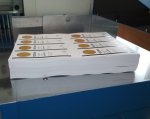Hello,
in past few months our Canon IP6010 produce very wavy prints (see photos). This happens on all papers from 90gsm to 250gsm coated/uncoated. I've already read here on PrinPlanet some threads about curl issues and it seems that there are two main reasons: humidity (moisture) and high temperature (in fuser). After discussion with Canon service technicians we did some measurements of humidity in the printer room. However it seems that humidity doesnt have such an influence (we tried printing when there was 30% as well as 55% humidity and paper was prepared in the room more than two days before print). So it seems that in our case there will be some issue with high temperature inside printer (broken thermostat in fuser?). Do somebody have some experience with similar issue? Do you know if there is some posbilities to control temperature on Canon IP6010? Our Canon technicians said that such a waves are ordinary on digital machines... and that it is caused due to humidity - nothing about overheating... As i've wrote, we already did a lot of humidity measurements...
Thanks for every advice!
Vojta
in past few months our Canon IP6010 produce very wavy prints (see photos). This happens on all papers from 90gsm to 250gsm coated/uncoated. I've already read here on PrinPlanet some threads about curl issues and it seems that there are two main reasons: humidity (moisture) and high temperature (in fuser). After discussion with Canon service technicians we did some measurements of humidity in the printer room. However it seems that humidity doesnt have such an influence (we tried printing when there was 30% as well as 55% humidity and paper was prepared in the room more than two days before print). So it seems that in our case there will be some issue with high temperature inside printer (broken thermostat in fuser?). Do somebody have some experience with similar issue? Do you know if there is some posbilities to control temperature on Canon IP6010? Our Canon technicians said that such a waves are ordinary on digital machines... and that it is caused due to humidity - nothing about overheating... As i've wrote, we already did a lot of humidity measurements...
Thanks for every advice!
Vojta









